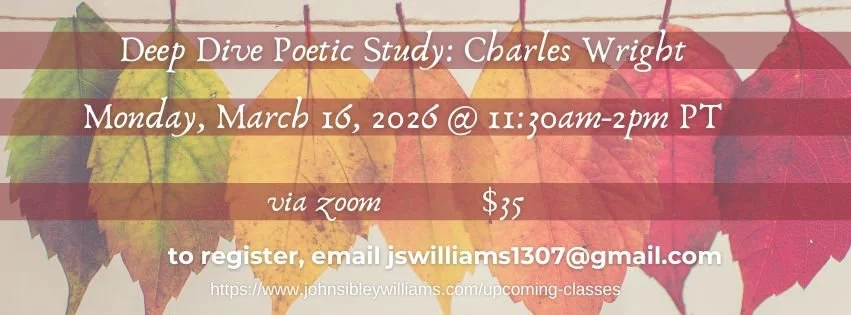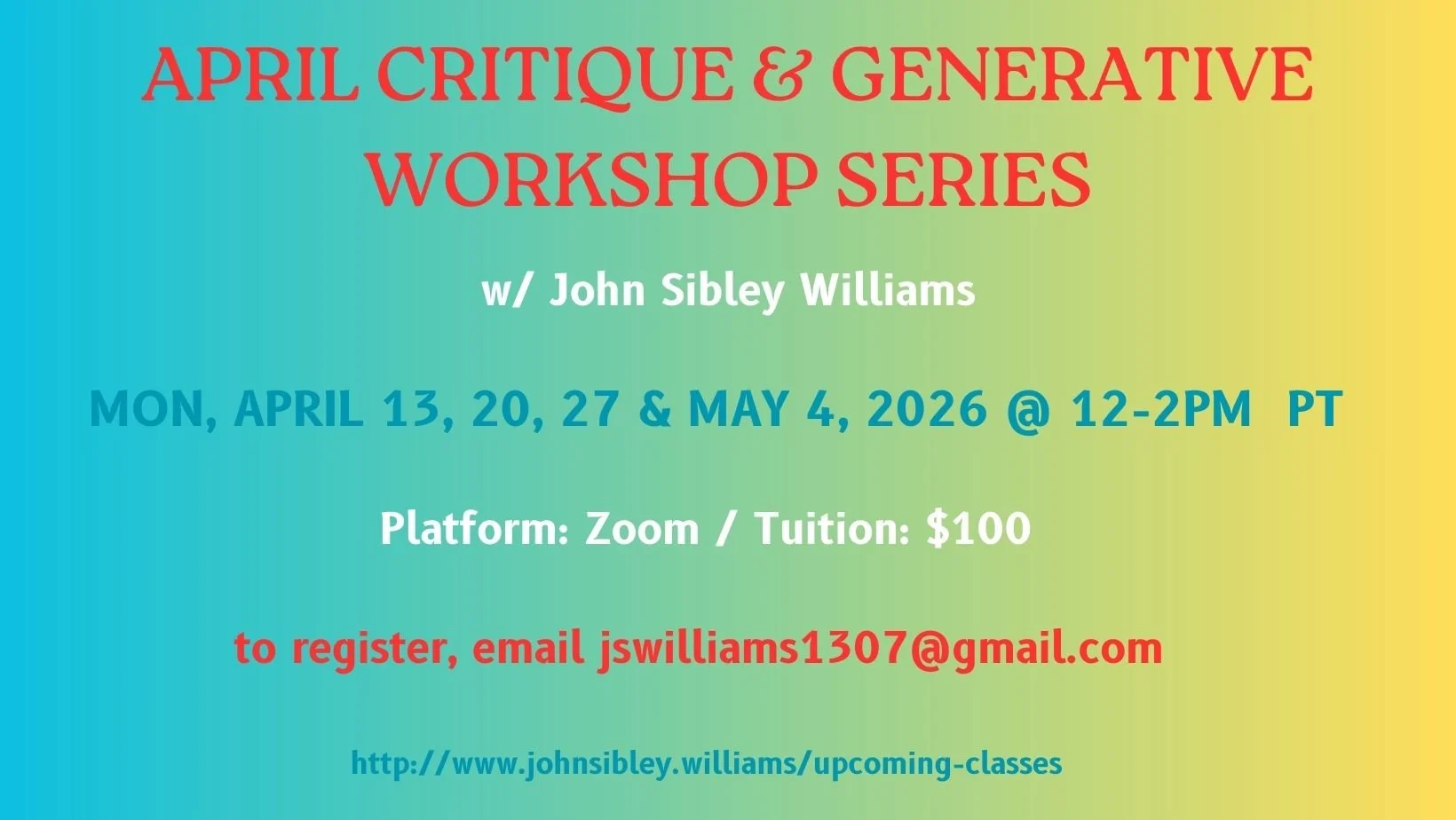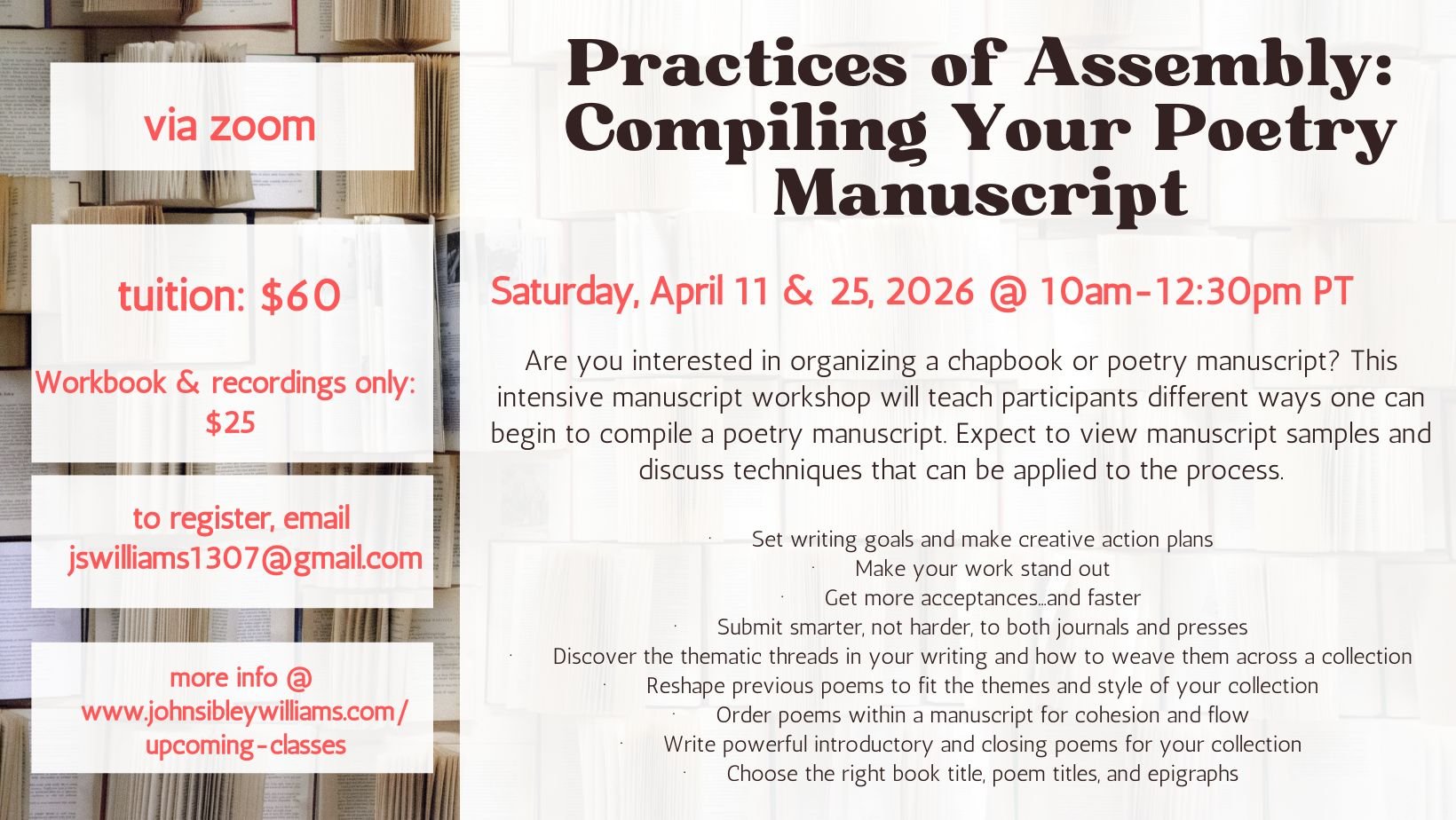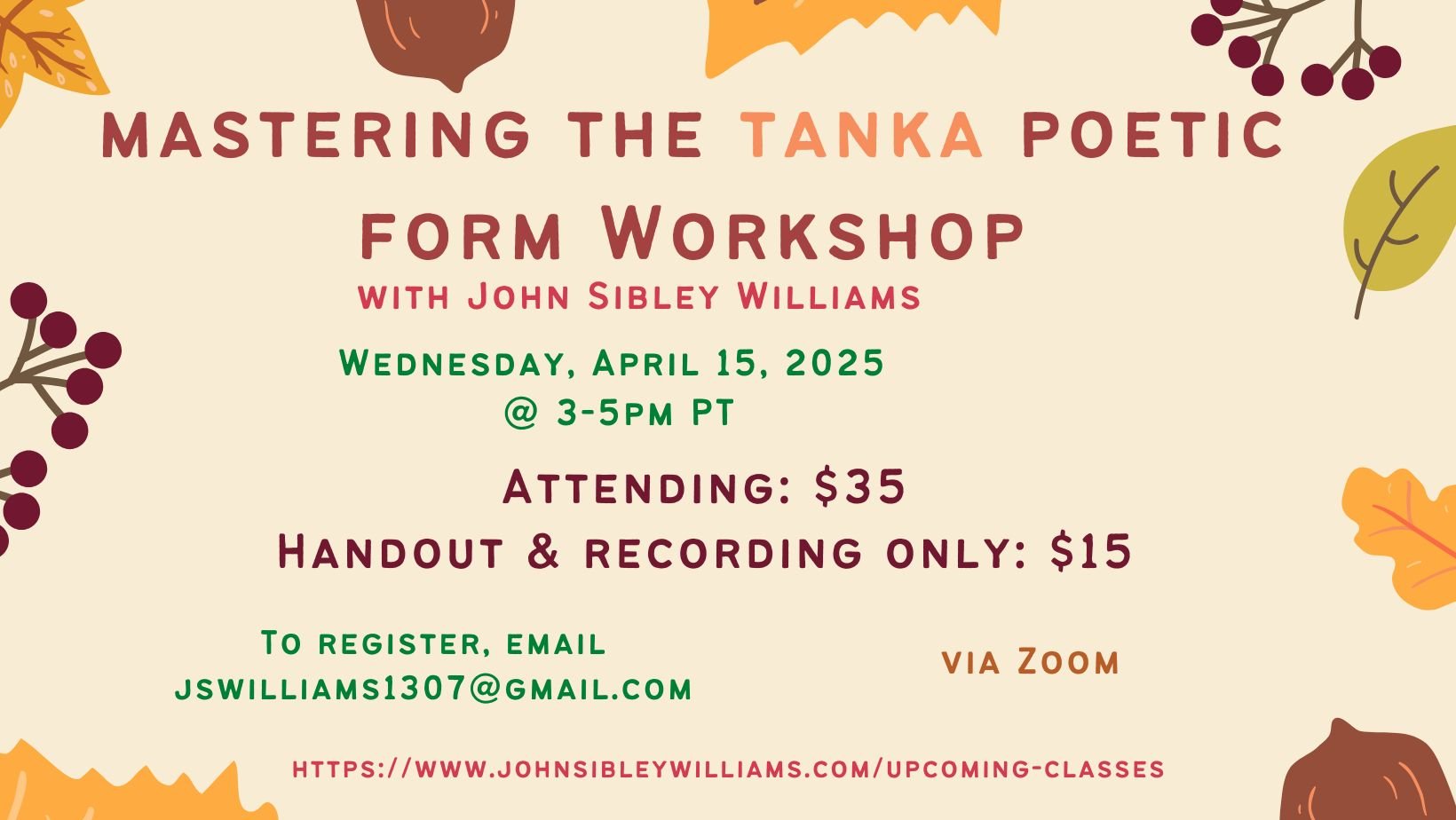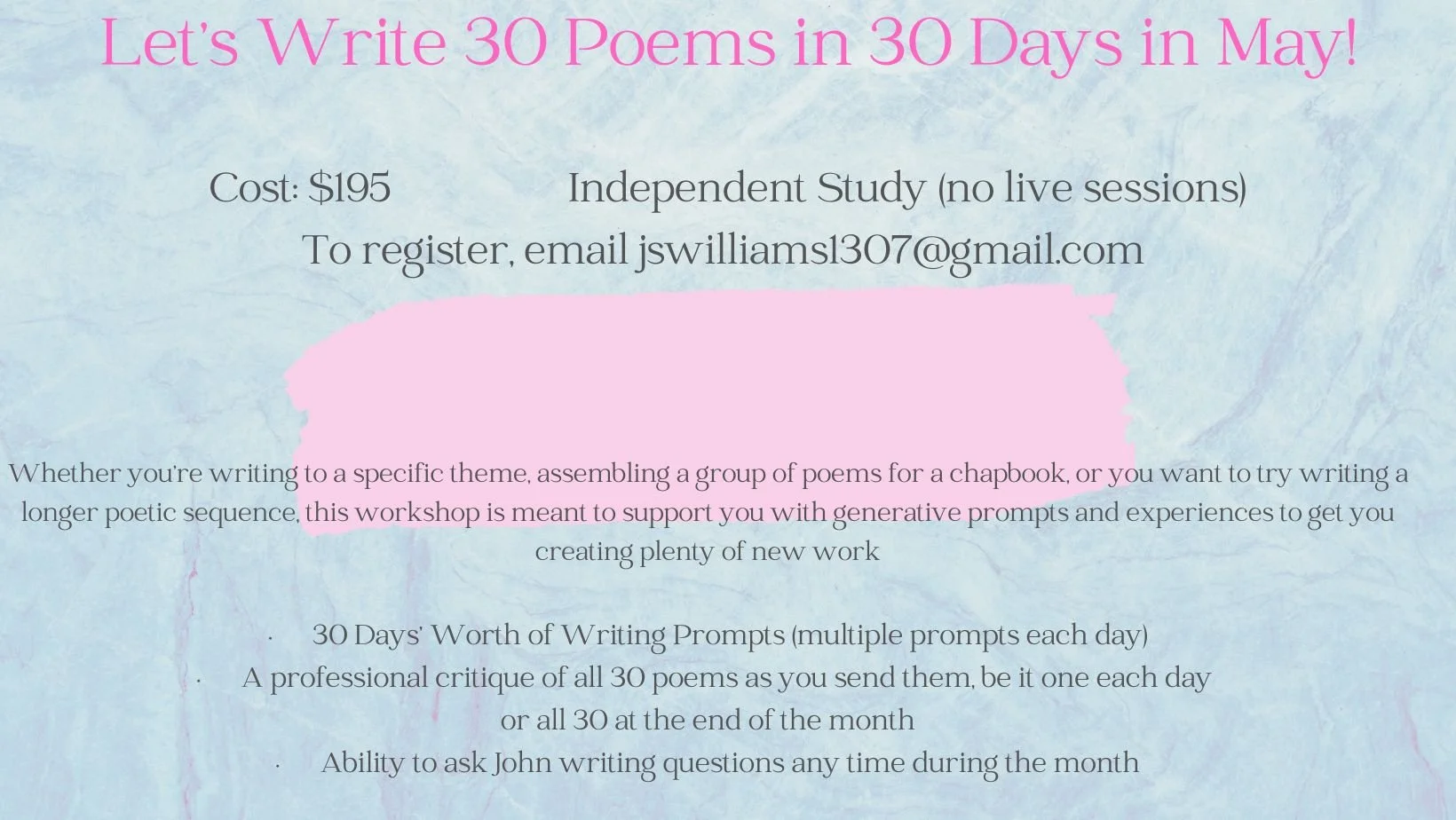Unless otherwise noted, all workshops are held via Zoom.
Please email jswilliams1307@gmail.com to register.
Accepted forms of payment: PayPal, Venmo, Zelle, or mailed check.
This workshop will delve deeply into a number of Wright’s poems, including his themes, style, and perspective, via active group discussion and writing prompts and some writing time to help you engage more directly with and be inspired by his work…putting his lessons into practice. And the class includes a robust handout!
To keep you consistently inspired, writing, and honing your craft, and to keep you engaged in a passionate poetic community, this month-long workshop series is aimed at helping you see your poems in a new light, broadening your vision, and improving your mechanics. Topics likely to arise include syntax, lineation, sound and rhythm, tone and mood, use of imagery, balancing the personal and universal, and other rhetorical strategies.
We will meet in a small, intimate, trusting group in which we can be honest and supportive of each other’s work. Each poet will compose one new poem each week, and we will start each session by reading and lightly critiquing it as a group. You will also receive intensive written feedback on each poem from me prior to the session. We will then move on to mini-lessons, fresh prompts, and hopefully some writing time!
Each week you will receive an inspiring seed idea designed to trigger the creation of a poem, share ideas about the process of writing poetry, workshop one of your poems, and receive feedback from the workshop group. Then, at the end of the week, I will give you a detailed response to your poem – with praise for the places where your poem is evocative and powerful, along with suggestions for revision where the poem has not reached its full potential. My goal is to give you a deeper understanding of poetry, a deeper love of language, and a stronger mastery of the techniques which make a modern poem work. I look forward to being a catalyst to help you take the next step in your writing!
Join award-winning poet, teacher, editor, and literary agent John Sibley Williams for this intensive two-session workshop that will take you all the way from inspiration to publication! This workshop is for poets ready to organize their work into a collection, as well as working toward journal and book publication.
Are you interested in organizing a chapbook or poetry manuscript? This intensive manuscript workshop will teach participants different ways one can begin to compile a poetry manuscript. Expect to view manuscript samples and discuss techniques that can be applied to the process.
We will explore all the ins-and-outs of organization and publishing a chapbook or full-length, from writing toward a given theme to setting and keeping to creative deadlines to learning how to submit smarter, not harder. Poets will be guided through a series of lessons and hands-on activities that each focus on a different aspect of creating, structuring, and finally publishing a new collection.
Topics include selecting the best title, focusing on your first and last pieces, finding the thematic threads in your writing, organizing the entire collection so that it reads smoothly, deciding which structure works best for you, and submitting individual pieces to magazines and the book as a whole to publishers and contests.
Learn how to:
· Set writing goals and make creative action plans
· Make your work stand out
· Get more acceptances…and faster
· Submit smarter, not harder, to both journals and presses
· Discover the thematic threads in your writing and how to weave them across a collection
· Reshape previous poems to fit the themes and style of your collection
· Order poems within a manuscript for cohesion and flow
· Write powerful introductory and closing poems for your collection
· Choose the right book title, poem titles, and epigraphs
One of the oldest Japanese forms, tanka originated in the seventh century, and quickly became a highly preferred verse form. A thirty-one-syllable poem, traditionally written in a single unbroken line, tanka translates as “short song” and is better known in its five-line, 5/7/5/7/7 syllable count form.
This intimate workshop will include lessons, analysis of well-known ancient and contemporary tanka, in-class activities and writing, and (optional) sharing drafts with the class.
Similar to the goals of NaPoWriMo (National Poetry Writing Month), the aims of this self-paced class is to write 30 poems in 30 days. However, you might write one poem a day, or several poems in a day, and then give yourself a break. It’s totally up to you!
Whether you’re writing to a specific theme, assembling a group of poems for a chapbook, or you want to try writing a longer poetic sequence, this workshop is meant to support you with generative prompts and experiences to get you creating plenty of new work.
What This Workshop Provides:
· 30 Days’ Worth of Writing Prompts
· A professional critique of all 30 poems as you send them, be it one each day or all 30 at the end of the month
· Ability to ask John writing questions any time during the month
